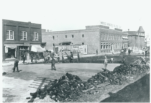What’s Up Doc?: Anal fissure causes pain in the butt
By Dr. Noorali Bharwani on August 6, 2019.
Anal fissure is a painful and annoying problem. I have written about this twice in the past years (2004 and 2014). These columns are posted on my website. I thought it is about time to review the subject again. An anal fissure is a tear in the lining of the anus (anal mucosa). Most often it is caused by injury sustained during passage of a large hard bowel movement. Pain in the butt may be mild to severe. It may be acute or chronic (recurrent). Sometimes pain is associated with bleeding. Other causes of anal fissure are chronic diarrhea, anal intercourse and childbirth. There are other less common causes of anal fissures. These are: Crohn”s disease or another inflammatory bowel disease, anal cancer, HIV, tuberculosis and syphilis. Fissures of less than six to eight weeks’ duration are acute, and those persisting longer are chronic. Chronic fissures are associated with skin tags at the edge of anal margin. Anal fissures are very common in young infants but can affect people of any age. Most anal fissures get better with simple treatments, such as increased fiber intake or sitz baths. Some people with anal fissures may need medication or, occasionally, surgery. About 90% of fissures are located in the upper or lower anal midline. Fissures that are not in the midline (atypical locations) may be associated with cancer, Crohn’s disease, HIV, syphilis or tuberculosis. The good news is most fissures will resolve with medical management. Studies have shown up to 87% of acute fissures treated with a high-fibre diet or stool-bulking agents (psyllium) and sitz baths twice daily will resolve the problem. Patients with chronic fissures require the addition of topical smooth muscle relaxants (two per cent diltiazem). Medical management will heal chronic fissures in 65 to 95% of patients. There is strong evidence that topical calcium channel blockers (diltiazem) have fewer adverse effects and similar fissure healing rates when compared with topical nitrates (0.2% nitroglycerin ointment). More patients complain about headache with nitrates than diltiazem. Diltiazem works by relaxing the muscle around the anus (the anal sphincter). This reduces pressure and increases blood flow to the area to allow healing to occur. About 30% of patients will have recurrence of fissure after medical therapy. Certain fissures may heal quite quickly, whereas others can take several months to heal. Patients whose fissures do not resolve after six to eight weeks of medical management should be considered for botulinum toxin injection or surgical management. Even with classic symptoms and a midline fissure, patients with new rectal bleeding who are older than 50 years or have any suspicious symptoms (weight loss, change in bowel habits, unexplained anemia or family history of colon cancer) require colonoscopy to rule out a more proximal cause of bleeding. Some individuals will need surgery. The most effective surgical procedure is called partial lateral internal sphincterotomy (division of anal sphincter). Most people will notice that the pain from an anal fissure goes away within a few days after the surgery. In my experience most people find immediate relief after surgery. Rarely a small number of people have problems controlling stools when they pass gas. This usually gets better with time. Surgical treatment is offered to those who do not respond to medical treatment or who have frequent recurrences. The rate of recurrence of fissure after surgery is small, about 3% in one study. How can I prevent getting a fissure in the future? The quality and quantity of stool passing through the anal sphincter is important. It should be soft, bulky and dry. Chew your food well. Eat lots of fruits and vegetables. Use psyllium daily. And relax when you have a bowel movement. Dr. Bharwani is a general surgeon, freelance writer, photographer and author of A Doctor’s Journey and Doctor B’s Eight Steps to Wellness. His latest book is available at Shoppers Drug Mart and Coles Book Store (Medicine Hat Mall), and http://www.nbharwani.com. You can discuss this article and other articles on his website: nbharwani.com and sign up for RSS feed, Twitter or get on the email list. 18-17




